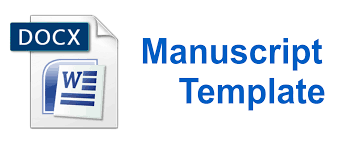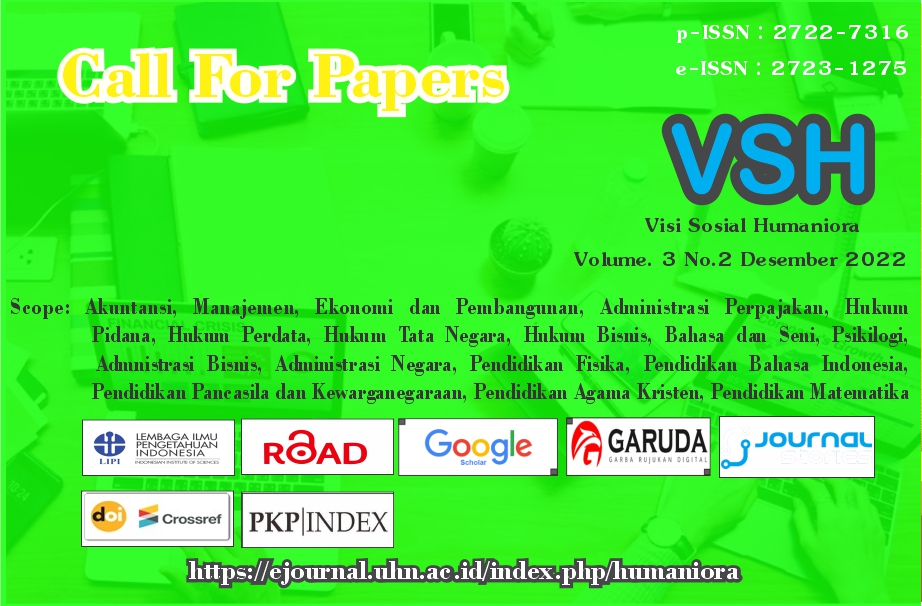Hubungan Antara Self-Regulated Learning Dan Intensi Penggunaan Media Sosial Pada Remaja Di Kota Medan
DOI:
https://doi.org/10.51622/vsh.v2i2.409Keywords:
Self-regulated learning,, Intensi Penggunaan Media SosialAbstract
The purpose of this study was to determine whether there is a relationship between self-regulated learning and the intention to use social media among adolescents in Medan. The participants in this study were 275 teenagers in Medan. The data collection was carried out by distributing the self-regulated learning scale and the social media use intention scale, online using the google form. The data analysis technique used descriptive analysis in the form of categorization of self-regulatory learning scores and scores of intention to use social media. In order to test the hypothesis, the correlation analysis was conducted. The results showed that research participants with high self-regulated learning were 44.4% (n=122), while those with the medium category were 52% (n=143) and those with low categories were 3.6% (n=10). The research participants with the intention to use social media in the high category were 17.1% (n=47), in the medium category are 74.9% (n=206) and in the low category are 8.0 % (n=22). Based on the results of the correlation test, the correlation coefficient value was -0.064, with a significance level of 0.288 (p> 0.05). With these results, it means that there is no significant relationship between self-regulated learning and the intention to use social media in adolescents in Medan. Thus the hypothesis of this study was rejected. Further discussion of the results is presented
Downloads
References
Ajzen, I. 2005. Attitudes, Personality, and Behavior. 2ndEdition. New York: Open University Press.
Ajzen, I., & Fishbein, M. 2005. Theory based Behavior Change Interventions: Comments on Hobbits and Sutton. Journal of Health Psychology, Volume 10, Nomor 1, 27-31.
Asosiasi Penyelenggara Jasa Internet Indonesia. 2019. Hasil Survei Penetrasi dan Perilaku Pengguna Internet Indonesia 2018. Jakarta: Asosiasi Penyelenggara Jasa Internet Indonesia.
Azwar, S. 2005. Sikap Manusia: Teori dan Pengukurannya.Yogyakarta: Pustaka Pelajar.
Fasikhah, S. S., & Fatimah, S. 2013. Self-Regulated Learning (SRL) dalam Meningkatkan Prestasi Akademik pada Mahasiswa. Jurnal Ilmiah Psikologi Terapan, Volume 1
Friedman, H.. S., & Schustack, M.W. 2006. Kepribadian Teori Klasik dan Riset Modern. Edisi 3. Erlangga.
Ghufron, M. N., & Suminta, R. R. 2010. Teori-teori Psikologi. Jogjakarta: Ar-Ruzz Media.
Ghufron, M. N., & Suminta, R. R. 2017. Hubungan Antara Kepercayaan Epistemologis dengan Belajar Berdasar Regulasi Diri. Jurnal Psikologi Insight, 40-54.
Hurlock, E. B. 2002. Psikologi Perkembangan. 5thedition. Erlangga: Jakarta.
Kristiyani, T. 2016. Self-Regulated Learning Konsep, Implikasi, dan Tantangannya Bagi Siswa di Indonesia. Yogyakarta: Sanata Dharma University Press.
Matlin, W. M. 1989. Cognition Second Edition. United States of America: The Dryden Press
Monks, F. J., Knoers, A. M. P., & Haditono, Siti R. 2006. Psikologi Perkembangan Pengantar dalam berbagai bagiannya. Yogyakarta: Gadjah Mada University Press.
Moriansyah, La. 2016. Motivasi, Sikap, dan Intensi Penggunaan Media Sosial pada Kampanye Stop Illegal Fishing. Jurnal Managemen & Agribisnis, Volume 13, Nomor 3.
Puspita, S. A L & Rustika, I M. 2018. Peran Self Regulated Learning Dan Konsep Diri Terhadap Prestasi Akademik Mahasiswa Remaja Akhir Fakultas Kedokteran Universitas Udayana Yang Pernah Menjadi Finalis Bali Pageants. Jurnal Psikologi Udayana, Volume 5, Nomor 1
Rafiq, A. 2020. Dampak Media Sosial Terhadap Perubahan Sosial Suatu Masyarakat. Global Komunika, Volume 1, Nomor 1
Riset Youth Audience Measurement. 2020. Walau Aktif Bermedia Sosial, Generasi Muda Memilih Selektif untuk Berkomentar.
Ropp, M. 1998. A New Approach to Supporting Reflective Self Regulated Computer Learning. www.coe.uh.edu/insite/elec pub/HTML 1998/re ropp.htm
Santrock, J. W. 2007. Psikologi Pendidikan Edisi Kedua. Jakarta: Kencana Prenada Media Group.
Sarwono. S. W. 2002. Psikologi Sosial: Individu dan Teori-teori Psikologi Sosial. Jakarta: Balai Pustaka.
Setyorini. D. 2018. Faktor-faktor yang Mempengaruhi Intensi Berwirausaha Mahasiswa Jurusan Pendidikan Ekonomi Universitas Negeri Yogyakarta. Skripsi Dipublikasikan.
Sifa, Izka A M & Sawitri, Dian R. 2018. Hubungan Regulasi Diri Dengan Adiksi Media Sosial. Jurnal Empati, Volume 7, Nomor 2.
Simanjuntak, E, Nawangsari, N. A F & Ardi, R. 2018. Cyberslacking Among University Students: The Role of Internet Habit Strength, Media Multitasking Efficacy and Self Regulated Learning. In Proceedings of the International Conference on Psychology in Health, Educational, Social and Organizational Settings, Surabaya, Indonesia
Triastuti, Endah, Adrianto, Dimas, & Nurul, Amal. 2017. Kajian Dampak Penggunaan Media Sosial Bagi Anak dan Remaja. Jakarta : Pusat Kajian Komunikasi, FISIP Universitas Indonesia
Utami, P. D., & Aviani, Y. I. 2021. Hubungan Antara Regulasi Diri dengan Fear of Missing Out (FoMO) pada Remaja Pengguna Instagram. Jurnal Pendidikan Tambusai, Volume 5, Nomor 1
We Are Social & Hootsuite.2020. Digital Data Indonesia 2020. In Data Reportal. Retrieved from https://datareportal.com/reports/digital-2020-indonesia
Wibowo, Danan S. & Nurwindasari, Ratna. 2019. Hubungan Intensitas Penggunaan Instagram Terhadap Regulasi Diri Dan Fear Of Missing Out. Prosiding Seminar Nasional & Call Paper Psikologi Sosial.
Zimmerman, B. J., & Martinez-Pons, M. 1988. Construct validation of a strategy model of student self-regulated learning. Journal of Educational Psychology, Volume 80, 284-290.
Zimmerman, Barry J. 1989. A Social Cognitive View of Self-Regulated Academic Learning. Journal of Educational Psychology, Volume 81, Nomor 3
Zimmerman, Barry. J. 1990. Becoming a Self-Regulated Learner: An Overview. Theory into Practice, Volume 41, Nomor 2
Zimmerman, B.J. 2002. Becoming a Self-Regulated Learner: An Overview Theory into Practice. Journal of Educational Psychology. Volume 4, Nomor 2, 64-70.
Published
How to Cite
Issue
Section
Copyright (c) 2021 Visi Sosial Humaniora

This work is licensed under a Creative Commons Attribution 4.0 International License.












